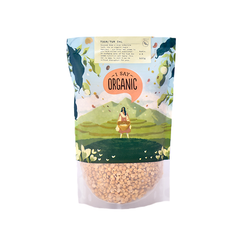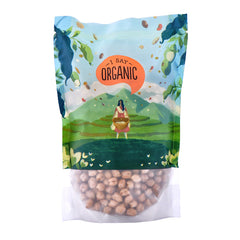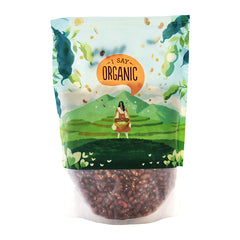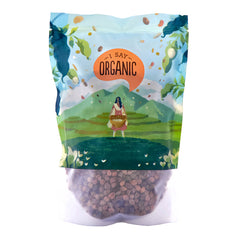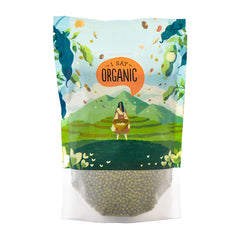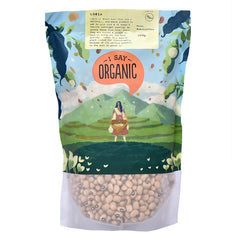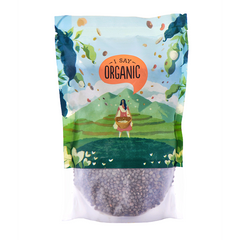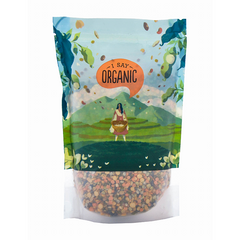- Page 1 of 2
- Next page
Nutritious Lentils & Pulses Online for you
Indian cooking is extremely incomplete without the usage of dals and pulses. Lentils and pulses are the home to many Indian recipes. Various types of lentil pulses are there that are used accordingly in different dishes. All whole lentils, pulses and organic dal are stored in airtight containers in the kitchen. Lentils do not require soaking before preparing into a dish and they cook significantly more rapidly than dry beans due to their size. They are a readily available source of superior protein because of their enormous versatility and low cost. A seed that grows in pod is known as pulse. They are available in different varieties of sizes, shapes and colors. Examples of pulses are chickpeas, kidney beans, baked beans, garden peas, runner beans, etc.
read more content
Lentils and pulses are two types of legumes that are commonly used in cooking. They are both widely consumed around the world and are used in a variety of dishes. Some of the most common uses for lentils and pulses include being used in soups, stews, and Indian dishes, such as dal and channa. They are also widely used in baked goods, such as cookies and pieces of bread. Lentils and pulses are both types of dried beans that are used often in cooking and, when ground, can be used as a protein-rich vegetarian source of protein. They are also very healthy: they are low in fat, high in fibre and protein, and contain a host of other nutrients. The two are often used interchangeably, but they are actually different varieties of the same plant, Lens, which is why they are sometimes referred to as "pulses".
Difference between lentils and pulses
The healthy tussle between pulses vs lentils is a famous kitchen argument. Knowing the lentils and pulses difference is important for any food lover. The primary distinction between both of them is that lentils contain lens shape seeds and they are a type of pulse whereas pulses are edible seeds of legumes. Types of pulses in India include dried peas, chickpeas, and dried beans and types of lentils in India are red, green, and other varieties. Learn more about lentils vs pulses in this blog. Now buy lentils in India online from I Say Organic. Best place to easily avail the opportunity of getting doorstep delivery of different lentils, pulses and dals. Organic and sustainable products are must have in your diet.
Buy organic dal and pulses online from I Say Organic
Lentils and pulses are a crucial part of our daily diet and contribute a lot to our health. Therefore, it is necessary to buy healthy lentils and pulses online. At I Say Organic you can buy dals online that are 100% pure, unpolished and unadulterated ensuring that they are nothing but beneficial for your body. Let’s look at some organic options available online at I Say Organic:
Organic Moong Dal Dhuli (Green Gram Split, De-husked):
Moong Dal is a variety of rice that we source from the evergreen fields of Nadia, W.B. It is known for its versatility and long shelf-life, making it popular in the Indian subcontinent. Moong Dal is a yellow, granular variety of rice, with an intense mustard-like flavour that is often described as "hot" or "burning" on the palate, despite the fact that it is, in fact, not particularly hot.
Organic Masoor Dal Split (Red Lentil Split):
The masoor dal is one of the most popular legumes in India. It is a red and white lentil usually referred to as red lentils, which in most countries is available in a red-coloured colour, but is also available in other colours. They are loaded with protein and essential minerals and vitamins, which make them a portion of healthy food. Salads, soups, and curries can all be made with lentils.
Organic Safed Chana (White Chickpeas):
Safed chana is a portion of very healthy and nutritious food. It has less fat and more protein than regular chana. Safed chana is made from chickpeas and chickpea flour and is a perfect substitute to junk food. It is an excellent source of fibre, protein and nutrition and can even help you lose weight. Bake, boil, or fry these chickpeas they are definitely going to make you have more of it!
Organic Tur Dal:
We source our Tur Dal from the best-suited, fertile lands of Jaipur, Rajasthan, from a group of farmers who are given the opportunity to go chemical-free and get fair prices for their product! This dal has been hand milled without polishing. Besides being high in fibre, Tur dal also tastes great.
Organic Bengal Gram Split (Chana Dal):
Chana dal is chickpea flour, ground from dried chickpeas, that is used in many Indian dishes as a thickener, and also in some sweets like halwa and mudfish cakes. It used to be the staple ingredient in Indian bread, but more recently it has been used in a wide variety of non-bread products, including in the production of cookies, crackers, and packaged foods. Its low glycemic index makes it the best ingredient to be used in diabetic patients' daily diet.
Organic Kala Chana (Bengal Gram Whole):
Kala chana, also known as black chickpeas, are small black beans that have a firm texture and a rich deep flavour. They are used in a variety of dishes, from curries to salads, and they are a great protein alternative to meat. They are also a good source of fibre and are packed with iron, which is great for energising your body.
Organic Rajma Chitra (Kidney Beans):
Kidney beans are small, oval legumes with a firm texture and mildly sweet flavour. They are commonly used in soups, stews, and Mexican and Indian dishes. They are also a great source of protein and contain dietary fibre, folate, and iron. An important feature of kidney beans is their ability to absorb water, which makes them versatile and the perfect choice for dishes that need thickening.
Why buy from I Say Organic?
Buying dals online may not be a huge decision but it surely needs to be correct because it can affect your and your family's health. You want to make sure you get the best organic dals online that improve your health and build a strong body. When you’re ready to buy, you have a lot of choices. You can go to a local store, a big chain store, or a small business, but I Say Organic beats them all. All our organic products are chemical and preservative-free which makes them the perfect addition to your diet. We also provide in flours, rice, vegetables, fruits, dry fruits, dried spices, pancake & waffle mix, makhana, healthy savoury snacks, fresh coconut water, apple cider vinegar online, barley powder online, sendha namak online, kuttu atta online, fox nuts online, corn flour online, soups online, mustard oil online, peanut butter online etc. We also have fresh Navratri specials like organic sesame chikki online, amaranth flour online, fast friendly flour combo, chaulai ke ladoo online, amaranth namkeen online and many more Navratri food items are available with us. Shop the healthy food items online and stay fit always.
FAQs
Q1: What is the difference between pulse and lentils?
In general, lentils are a type of pulse with lens-shaped seeds, while pulses come from edible seeds of legumes. Pulses include dried peas, chickpeas, and dried beans, while lentils include red lentils, green lentils, and Puy lentils.
Q2: Are all lentils pulses?
Yes, lentils are types of pulses like moong, yellow gram, split chickpeas, red lentils, etc. On the other hand, pulses also include other varieties such as dried peas and chickpeas.Pulses include all types of crops that are harvested in the form of dry grains for example dried soybean.
Q3: Which lentil has the highest protein content?
The famous ingredient used in dal makhani, black lentil is also known as urad ki dal is a type of whole pulses that includes a good amount of protein and vitamin B. High amounts of iron, calcium and magnesium are also present along with low fats and calories.
Q4:Is it good to eat pulses everyday?
Since pulses are extremely high in a good amount of nutrients they are very heart-healthy since the reduce your cholesterol and blood pressure. Consuming pulses on a daily basis can also help to keep your heart healthy, which lowers your risk of getting cardiovascular problems.
Q5: Which is the best time to eat pulses?
Since pulses are healthy and rich in protein they can be consumed at anytime during the day. Though, the best time to have it would still be considered during breakfast or lunch.
Q6: Which dal is high in fiber?
Among the various types of organic dal, moong dal is considered to be rich in dietary fiber. 40.5 to 71 of the advised intake of fiber can be consumed through one cup serving of moong dal.

